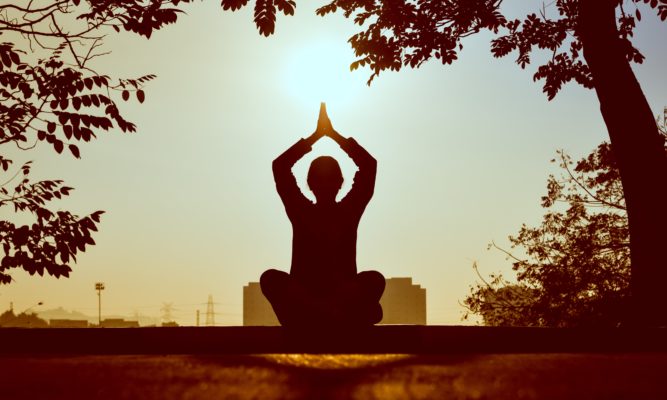The World Health Organization (WHO) defines depression as an illness featured by continuous sadness, lost interest in normal activities that one normally enjoys and inability to function daily activities for at least two weeks. Depression shows several symptoms including a reduced energy and concentration, change in appetite and sleeping levels, anxiety, indecisiveness, restlessness, feelings of worthlessness guilt and hopelessness and thoughts of self-harm or suicide. As per WHO’s records, depression affects people of all ages, from all walks of life, in all countries. Currently, about 300 million people are affected worldwide.
Based on recent scientific evidence, the ancient practice of yoga effectively combining postures (asana), breathing exercises (pranayama) and meditation offers a few solutions for depression. Here is how.
How Yoga Can Help with Depression

1. Yoga Teaches You to Breathe
Have you ever noticed your breath when you are anxious or stressed? It is shallow and fast. When it is shallow, less oxygen goes in and the tissue perfusion with oxygen is low. Low oxygen in the blood means reduced cellular metabolism, which can make you feel further low. How do you get out of it? Well, the solution is given by Sage Patanjali in his classical text on yoga – Yoga Sutras (a collection of 196 short aphorisms on yoga). It says by deliberately breaking the pattern of breathing you get out of the fluctuations in mind.
Breathing exercises in yoga have long been practiced as a tool to calm the mind. Yogic breathing exercises improve strength of the respiratory muscles, thereby improving tissue perfusion and more oxygen for the body. Sudarshan Kriya Yoga, a rhythmic breathing technique has shown substantial reduction in depression among war veterans, soldiers, and survivors of disasters and victims of anxiety and post-traumatic stress disorder. Getting rid of slouching, yogic postures in addition can “open up” the chest for relief from emotional stress. Yoga has been proposed as an effective alternative to electroconvulsive therapy or medication even in severe depression.
2. Yoga Elevates Levels of “Feel-Good” Hormones
Depression overstimulates the sympathetic nervous system (“fight or flight” functions), while it reduces the parasympathetic activity (“rest and digest” functions). Stimulation of sympathetic activity leads to secretion of stress hormones – adrenaline and cortisol, which in turn increase blood pressure, heart rate, respiration rate, and blood glucose levels. In addition, stress can release destructive free radicals to the blood stream. Stress over a long period increases the risk of chronic diseases such as diabetes, stroke, and cardiovascular diseases.
By activating the parasympathetic nervous system and slowing down the sympathetic activity, yoga restores the balance. Yoga not only reduces the harmful neurotransmitters cortisol and adrenalin, it increases endorphins, serotonin, GABA, and melatonin that elevate the mood. Yoga also reduces the damage by free-radicals on DNA and cellular aging.
3. Yoga Improves Your Sleep
A vast majority of people with depression report disturbed or altered sleep patterns, taking a long time to initiate sleep, increased wakefulness, reduced sleep efficiency and total sleep time. Yoga helps in balancing the sleep patterns through several ways.
For instance, yoga through significant physical and mental exertion followed by relaxation results in less sleep latency and disturbances, more deep sleep, and better sleep efficiency. Among snoring population, regular yogic breathing exercises (Pranayama) might reduce sleep disturbances by strengthening upper airway muscles. Meditation, in particular has shown to increase the secretion of melatonin – a hormone that regulates sleep and wake cycles.
In a study conducted among participants with moderate sleep disturbances, meditation has shown to reduce depression, insomnia, and fatigue, while it improved sleep quality. Yoga can reduce sleep disturbances by lowering physiological arousal – increased parasympathetic and reduced sympathetic activity.
4. Yoga Boosts Immunity
Depression has shown to alter the genes and immune system. On the other hand, yoga can slow down cellular aging, improve biological markers of immunity, and can even alter the DNA. Changes in the genes can be very rapid after a comprehensive yoga program.
A Norwegian study involving participants performing yogic postures, breathing and meditations for two days shows rapid (within 2 hours of start of practice) and significant changes in the gene expression. Yoga intervention influenced changes among 111 genes, whereas this number was 38 for the comparison regimen – music and walking relaxation.
Practitioners of yoga have shown enhanced capacity of cells to utilize nutrients and oxygen to generate energy (cellular metabolism). These changes in the genes may result in long term stable biological and overall health effects of yoga. Thus, yoga’s benefits are much more far-reaching than exercise and relaxation.
5. Yoga Gets Rid of Cravings
Depression and addiction are closely related. Addiction is not only restricted to substance use, but it can also mean overeating (specifically during chronic stress) or negative thinking. Research has shown that dwelling on stressful events in life can trigger inflammation. Regular practice of yoga has shown to reduce cravings as well as repetitive thoughts and related actions.
Women who underwent a yoga intervention for 8 weeks have shown a higher abstinence rate to smoking and lower anxiety in a study. In another study, participants who were subjected to yogic breathing exercises had a decline in strength of urges, cigarette craving and desire to smoke. Yogic breathing stretches the pulmonary receptors to give the similar kind of experience one gets with smoking. Overall, yoga brings the practitioner’s attention to the present moment while reducing anxious thoughts. It also teaches the importance of observing one’s own thoughts than reacting to them, and therefore developing a positive attitude towards life.
About the author
Dr. Ashis Das is a public health expert with a passion for social transformation by helping people to live a sustained healthy and happy life. He supports people across the world in adapting effective preventive, promotive and curative practices. In collaboration with global agencies such as the WHO, Unicef and the World Bank, he has assisted several countries in experimenting with innovative health solutions.

